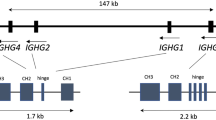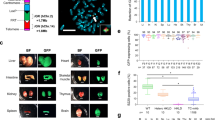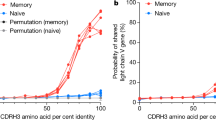Abstract
The products of the highly polymorphic genes known as the major histocompatibility complex (MHC) have been shown to play a major part in the control of several aspects of the immune response and of susceptibility to certain diseases1,2. The major transplantation antigens are membrane proteins composed of two noncovalently associated polypeptide chains: a light, non-polymorphic chain of molecular weight 12,000 (MW), called β2-microglobulin, and a polymorphic, glycosylated heavy chain of ∼45,000 MW. The heavy chains in man and mouse are encoded in at least three loci of the MHC named HLA-A, -B and -C, and H–2D, K and L respectively. The available amino acid sequence data indicate extensive homology between human and mouse heavy chains3,4. We therefore used a recently isolated cloned mouse H–2 cDNA probe5 to screen a human gene library. We have now characterized one of the recombinant phages obtained, λ HLA-12, and shown that it contains an authentic HLA sequence with evidence of a second one close by.
This is a preview of subscription content, access via your institution
Access options
Subscribe to this journal
Receive 51 print issues and online access
$199.00 per year
only $3.90 per issue
Buy this article
- Purchase on Springer Link
- Instant access to full article PDF
Prices may be subject to local taxes which are calculated during checkout
Similar content being viewed by others
References
Klein, J. in The Major Histocompatibility System in Man and Animals (ed. Gotze, D.) 339–378 (Springer, Berlin, 1977).
Svejgaard, A. in Immunology 1980, Progress in Immunology IV (eds Dausset, J. & Fougereau, M.) 530–540 (Academic, London, 1980).
Strominger, J. L. in Immunology 1980 Progress in Immunology IV (eds Dausset, J. & Fougereau, M.) 541–554 (Academic, London, 1980).
Martinka, J. M. et al. Biochemistry (in the press).
Kvist, S. et al. Proc. natn. Acad. Sci. U.S.A. (in the press).
Ploegh, H. L., Orr, H. T. & Strominger, J. L. Proc. natn. Acad. Sci. U.S.A. 77, 6081–6085 (1980).
Bregegere, F. et al. Nature (submitted).
Lawn, R. M., Fritsch, E. F., Parker, R. C., Blake, G. & Maniatis, T. Cell 15, 1157–1174 (1978).
Maxam, A. M. & Gilbert, W. Proc. natn. Acad. Sci. U.S.A. 74, 560–564 (1977).
Orr, H. T., Lancet, D., Robb, R. J., Lopez De Castro, J. A. & Strominger, J. L. Nature 282, 266 (1979).
Southern, E. M. J. molec. Biol. 98, 503–517 (1975).
Denhardt, D. Biochem. biophys. Res. Commun. 23, 641–646 (1966).
Wieslander, L. Analyt. Biochem. 98, 305–309 (1979).
Rigby, P. W. J., Dieckmann, M., Rhodes, C. & Berg, P. J. molec. Biol. 113, 237–251 (1977).
Benton, W. D. & Davis, R. W. Science 196, 180–182 (1977).
Blattner, F. et al. Science 196, 161–169 (1977).
Tu, C.P.D. & Cohen, S. N. Gene 10, 177–183 (1980).
Author information
Authors and Affiliations
Rights and permissions
About this article
Cite this article
Jordan, B., Bregegere, F. & Kourilsky, P. Human HLA gene segment isolated by hybridization with mouse H–2 cDNA probes. Nature 290, 521–523 (1981). https://doi.org/10.1038/290521a0
Received:
Accepted:
Issue Date:
DOI: https://doi.org/10.1038/290521a0
Comments
By submitting a comment you agree to abide by our Terms and Community Guidelines. If you find something abusive or that does not comply with our terms or guidelines please flag it as inappropriate.



